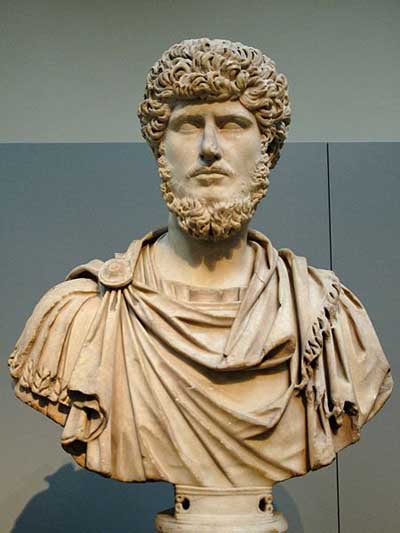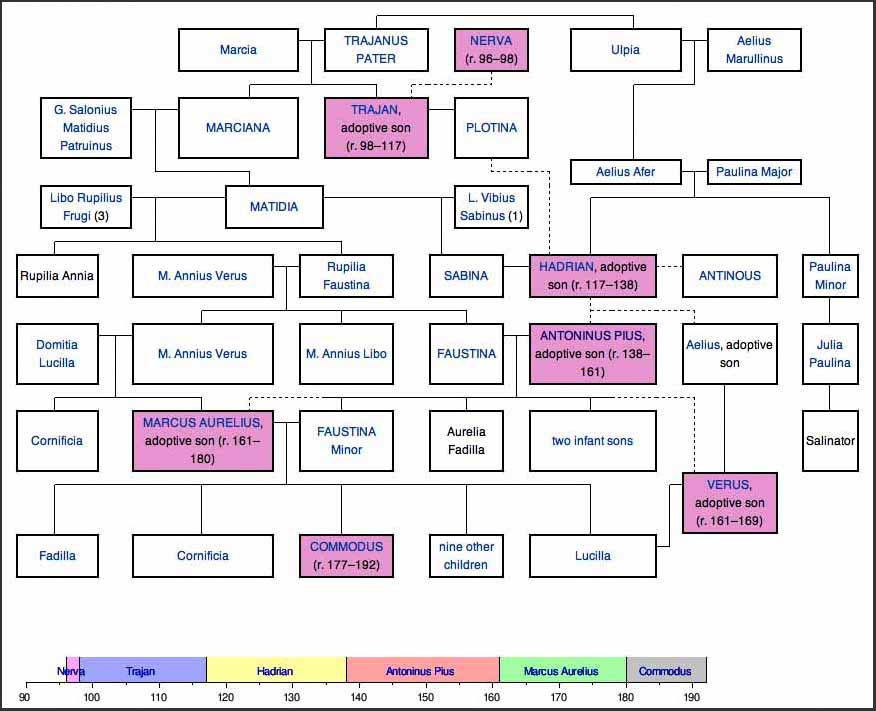
17th Emperor of the Roman Empire

17th Emperor of the Roman Empire
Lucius Verus 15 December 130 – 169), was Roman co-emperor with Marcus Aurelius, from 161 until his death.
Lucius Verus was the first born son to Avidia Plautia and Lucius Aelius Verus Caesar, the first adopted son and heir of Roman Emperor Hadrian (76-138). He was born and raised in Rome. Verus had another brother Gaius Avidius Ceionius Commodus and two sisters Ceionia Fabia and Ceionia Plautia. His maternal grandparents were the Roman Senator Gaius Avidius Nigrinus and the unattested noblewoman Ignota Plautia. Although his adoptive paternal grandparents were the Roman Emperor Hadrian and Roman Empress Vibia Sabina, his biological paternal grandparents were the consul Lucius Ceionius Commodus and noblewoman Aelia or Fundania Plautia.
When his father died in early 138, Hadrian chose Antoninus Pius (86-161) as his successor. Antoninus was adopted by Hadrian on the condition that Verus and Hadrian’s great-nephew Marcus Aurelius was to be adopted by Antoninus as his sons and heirs.
As a prince and future emperor, Verus received careful education from the famous “grammaticus” Marcus Cornelius Fronto. He was reported to have been an excellent student, fond of writing poetry and delivering speeches. Verus started his political career as a quaestor in 153, became consul in 154, and in 161 was consul again with Marcus Aurelius as his senior partner.
Antoninus died on 7 March 161, and was succeeded by Marcus Aurelius. Although Marcus had no personal affection for Hadrian (significantly, he does not thank him in the first book of his Meditations), he presumably believed it his duty to enact the man's succession plans.
Thus, although the senate planned to confirm Marcus alone, he refused to take office unless Lucius received equal powers. The senate accepted, granting Lucius the imperium, the tribunician power, and the name Augustus. Marcus became, in official titulature, Imperator Caesar Marcus Aurelius Antoninus Augustus; Lucius, forgoing his name Commodus and taking Marcus' family name, Verus, became Imperator Caesar Lucius Aurelius Verus Augustus. It was the first time that Rome was ruled by two emperors.
In spite of their nominal equality, Marcus held more auctoritas, or "authority", than Verus. He had been consul once more than Lucius, he had shared in Pius' administration, and he alone was Pontifex Maximus. It would have been clear to the public which emperor was the more senior. As the biographer wrote, "Verus obeyed Marcus...as a lieutenant obeys a proconsul or a governor obeys the emperor."
Immediately after their senate confirmation, the emperors proceeded to the Castra Praetoria, the camp of the praetorian guard. Lucius addressed the assembled troops, which then acclaimed the pair as imperatores. Then, like every new emperor since Claudius, Lucius promised the troops a special donative.
This donative, however, was twice the size of those past: 20,000 sesterces (5,000 denarii) per capita, more to officers. In return for this bounty, equivalent to several years' pay, the troops swore an oath to protect the emperors. The ceremony was perhaps not entirely necessary, given that Marcus' accession had been peaceful and unopposed, but it was good insurance against later military troubles.
Pius' funeral ceremonies were, in the words of the biographer, "elaborate". If his funeral followed the pattern of past funerals, his body would have been incinerated on a pyre at the Campus Martius, while his spirit would rise to the gods' home in the heavens.
Marcus and Lucius nominated their father for deification. In contrast to their behavior during Pius' campaign to deify Hadrian, the senate did not oppose the emperors' wishes. A flamen, or cultic priest, was appointed to minister the cult of the deified Pius, now Divus Antoninus. Pius' remains were laid to rest in the Hadrian's mausoleum, beside the remains of Marcus' children and of Hadrian himself. The temple he had dedicated to his wife, Diva Faustina, became the Temple of Antoninus and Faustina. It survives as the church of San Lorenzo in Miranda.
Soon after the emperors' accession, Marcus' eleven-year-old daughter, Annia Lucilla, was betrothed to Lucius (in spite of the fact that he was, formally, her uncle). At the ceremonies commemorating the event, new provisions were made for the support of poor children, along the lines of earlier imperial foundations. Marcus and Lucius proved popular with the people of Rome, who strongly approved of their civiliter ("lacking pomp") behavior. The emperors permitted free speech, evinced by the fact that the comedy writer Marullus was able to criticize them without suffering retribution. At any other time, under any other emperor, he would have been executed. But it was a peaceful time, a forgiving time. And thus, as the biographer wrote, "No one missed the lenient ways of Pius."
Fronto returned to his Roman townhouse at dawn on 28 March, having left his home in Cirta as soon as news of his pupils' accession reached him. He sent a note to the imperial freedman Charilas, asking if he could call on the emperors. Fronto would later explain that he had not dared to write the emperors directly.
The tutor was immensely proud of his students. Reflecting on the speech he had written on taking his consulship in 143, when he had praised the young Marcus, Fronto was ebullient: "There was then an outstanding natural ability in you; there is now perfected excellence. There was then a crop of growing corn; there is now a ripe, gathered harvest. What I was hoping for then, I have now. The hope has become a reality." Fronto called on Marcus alone; neither thought to invite Lucius.
Lucius was less esteemed by his tutor than his brother, as his interests were on a lower level. Lucius asked Fronto to adjudicate in a dispute he and his friend Calpurnius were having on the relative merits of two actors. Marcus told Fronto of his reading - Coelius and a little Cicero - and his family. His daughters were in Rome, with their great-great-aunt Matidia Minor; Marcus thought the evening air of the country was too cold for them. The emperors' early reign proceeded smoothly. Marcus was able to give himself wholly to philosophy and the pursuit of popular affection.[ Some minor troubles cropped up in the spring; there would be more later. In the spring of 162, the Tiber flooded over its banks, destroying much of Rome. It drowned many animals, leaving the city in famine. Marcus and Lucius gave the crisis their personal attention. In other times of famine, the emperors are said to have provided for the Italian communities out of the Roman granaries.
The Roman-Parthian War of 161-166 (also called the Parthian War of Lucius Verus) was fought between the Roman and Parthian Empires over Armenia and upper Mesopotamia. It concluded in 166 after the Romans made successful campaigns into lower Mesopotamia and Media and sacked Ctesiphon, the Parthian capital.
The next two years (166-168) were spent in Rome. Verus continued with his glamorous lifestyle and kept the troupe of actors and favorites with him. He had a tavern built in his house, where he celebrated parties with his friends until dawn. He also enjoyed roaming around the city among the population, without acknowledging his identity. The games of the circus were another passion in his life, especially chariot racing. Marcus Aurelius disapproved of his conduct but, since Verus continued to perform his official tasks with efficiency, there was little he could do.
In the spring of 168 war broke out in the Danubian border when the Marcomanni invaded the Roman territory. This war would last until 180, but Verus did not see the end of it. In 168, as Verus and Marcus Aurelius returned to Rome from the field, Verus fell ill with symptoms attributed to food poisoning, dying after a few days (169).
However, scholars believe that Verus may have been a victim of smallpox, as he died during a widespread epidemic known as the Antonine Plague. Despite the minor differences between them, Marcus Aurelius grieved the loss of his adoptive brother. He accompanied the body to Rome, where he offered games to honor his memory. After the funeral, the senate declared Verus divine to be worshipped as Divus Verus.
Dotted lines indicate adoption or (in the case of Hadrian and Antinous) alleged lovers
